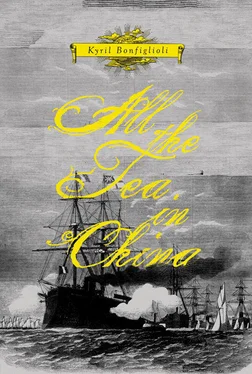“What in the devil’s name …?” I murmured to Peter.
“The ship astern of us,” he explained in an unhappy voice, “is almost certainly the Martha Washington , skippered by Micah Cattermole, Captain Knatchbull’s most deadly rival. He is young and fearless and, if he has had her bottom scraped, she has the legs of us by quite two knots. If she rounds Cape Comorin before us she will be in Calcutta three tides before us.”
“Is that important?”
“Very. The first at the opium auctions will pick up a raft of bargains and so will have cash to spare for the better quality chests at the end of the auctions. Worse, he will be in the Canton River before us and will skim the cream of the hungry market, have his bar-silver and new teas aboard and will be refitting for the voyage home before we have dropped our hook below the Two Islands.”
“I see,” I said vaguely. “And this change of course which seems to be so unwelcome to the crew?”
He took a deep breath.
“You see, Karli, in the ordinary way we would have taken the safe, comfortable, Eight Degree Channel, leaving Minicoy on our port and the Maldivhs on our starboard. But, now that we are being pressed by the Martha Washington our —” he looked about him cautiously “— our old maniac of a Captain is going to venture the Nine Degree Channel to the north of Minicoy Island. It is most hazardous. Captain Knatchbull reckons himself the only salt-water skipper who knows its little ways.” He fished out his watch. “We should be entering it just as night falls — and the wind is strengthening from the sou’west.”
I did not like the sound of any of this.
“Why is he doing this, do you suppose, Peter?”
“Because young Micah Cattermole is a dashing and hare-brained young fellow who will think that where one man can go another can follow. If he can win close enough to follow our lights he may succeed but our Captain is unlikely to help him in that way.”
“But …”
“Wait and see, Karli, and above all make no comments in the Captain’s hearing — he is a little, well, irrational, in matters concerning Micah Cattermole.”
The Captain emerged onto the poop and we heard him giving a more precise course to the quartermaster at the wheel, then bidding Lubbock have two reefs shaken out of our top-sails — reefs which had been made only an hour before on account of the freshing wind. One of the watch, as he scrambled aloft, made an audible sound of displeasure and Lubbock snarled at him, but without his usual fury. The wind was rising fast and ever larger waves began to chase our poop. The rigging began to whine and thrum and dusk gathered with the rapidity I had become so used to in those latitudes. Our ordinary sea-lights were lit and the Captain, to everyone’s mystification, ordered an extra light to be put at the mizzen-mast-head.
“And, comprador ,” he said, “I want lamps burning in all cabins aft; see to it.”
I exchanged glances with Peter. He said nothing.
Soon the Captain gave a fresh course to the helmsman and the deck was an organised riot of men bracing the sails around. The wind was now, of course, on our starboard quarter and imparting an unpleasant roll and yaw to the vessel, which nevertheless flew on at unabated speed.
Peter was sent to the fore royal yard and reported that he descried the Martha Washington’s lights abaft and still, he thought, fore-reaching on us. This did not seem to displease the Captain.
The First Mate hovered, as though awaiting an order.
“Shorten sail, Sir?” he said at last, in a more diffident voice than I had ever heard him use. We were now, it was clear even to me, well into the perilous channel.
The Captain glared at him evilly. “Thankyou for your advice, Mister,” he whispered, “but giving advice to the Master of a vessel is not part of a First Mate’s duties. Pray call all hands on deck: I’ll have both bower anchors cock-a-bill and six men at the bill-boards of the sheet anchor. In exactly eight minutes I shall give orders to bring the ship up into the wind and, at precisely that moment, I’ll have every light in the ship dowsed.”
The First Mate gaped.
“And Mister, I’ll have all these manoeuvres carried out in silence, d’ye hear?”
“Aye aye, Sir.”
In just seven and one half minutes the man in the chains with the lead sang out that he had “by the mark” eight fathoms “and shoaling fast”.
To me, we were in the midst of a torrent of tearing waters buffetted by fearful winds but the Captain seemed as at home as if he were in his own parlour. Every light was dowsed in an instant; the ship came up into the wind and all three great anchors roared out together, bringing the ship up into the wind with a wrench which one would have thought would jar the very masts out of her.
There was, suddenly, no sound but the smash of the waves on our bows, no sight but the phosphorescence at our bows.
“A barrel of oil from the bows,” growled the Captain. In a minute the phosphorescence had gone and the crashing of the seas onto our stem became a mere schlipp-schlopp. We waited. We waited perhaps an hour, I cannot tell at this remove of time. Suddenly, like a ghost, a tall and lovely ship came storming past, like a vision. Her creaming bow-wave and the radiance of her wake were the most beautiful thing I had ever seen: it was like looking at a lovely, naked woman in the prime of her beauty.
She did not see us and soon vanished into the dark, leaving a dwindling wake of phosphorescence. Later, the Captain ordered the galley-stove to be re-lit and the lamps in cabins and forecastle; but not the great riding lights. Soon the watch below was piped but they were already on deck, muttering in groups.
In a wonderfully short time the cook had hot supper ready for the watch relieved but there was not the usual rush of mess-men to the galley. Indeed, I had to send an “idler” to find Orace before I could get my supper: he, like most of the men, was far forward, still staring into the darkness where the Martha Washington had sailed. I was not in the least hungry, but those in peril on the sea have a natural duty to keep up their strength, you understand. The meal was, as I recall, a “bindalooh” or sour-pork kari; very good except that the rice was over-moist. I had become a connoisseur in these matters by then.
I was lying on my bunk, meditating on the frailty of the human spirit, especially in the fair sex, when Orace rushed into the cabin without rapping and said that Lord Stevenage sent his compliments and would I join him on deck. Sighing, I struggled into a pair of trowsers and a hat (the latter was essential: the Captain insisted on his “gentlemen” saluting the quarterdeck in a proper fashion) and sought out Peter. He was in what seemed to be a heated altercation with the Captain.
“No, Mr Lord Stevenage,” the Captain was growling, “I shall not weigh anchor, nor set sail. You have, I fancy, enough seamanship to know that these waters are perilous at night and I know my duty to my owners and my crew. What you think you see may or may not be the Martha Washington: it is just as likely to be a lure set by wreckers for our destruction. If it were the Martha , we could not reach her until she were burned out and in this darkness and sea we could do nothing for survivors. You have now had more explanation than I commonly give to junior officers. Pray attend to your duties. Clear the decks of the watch below, who should be getting their sleep. Write on the watch-slate that the ship is to be ready to weigh anchor and set sail at first light.”
Just as he turned on his heel I heard Peter whisper something to him of which I could hear nothing except, it seemed to me, the word “murder”. The Captain stood still. Then he said:
Читать дальше












